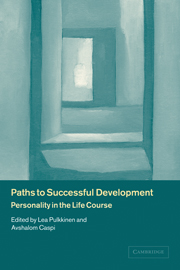Book contents
- Frontmatter
- Contents
- List of contributors
- Personality and paths to successful development: an overview
- Part I Temperament and emotion regulation
- Part II Formation of social relationships
- Part III Continuity in individual life paths
- Part IV Environmental contributions to personality development
- Part V Life transitions
- 10 Developmental regulation of life-course transitions: a control theory approach
- 11 Social selection, social causation, and developmental pathways: empirical strategies for better understanding how individuals and environments are linked across the life-course
- 12 Pathways through challenge: implications for well-being and health
- Part VI Personal goals and well-being
- Index
- References
11 - Social selection, social causation, and developmental pathways: empirical strategies for better understanding how individuals and environments are linked across the life-course
Published online by Cambridge University Press: 22 September 2009
- Frontmatter
- Contents
- List of contributors
- Personality and paths to successful development: an overview
- Part I Temperament and emotion regulation
- Part II Formation of social relationships
- Part III Continuity in individual life paths
- Part IV Environmental contributions to personality development
- Part V Life transitions
- 10 Developmental regulation of life-course transitions: a control theory approach
- 11 Social selection, social causation, and developmental pathways: empirical strategies for better understanding how individuals and environments are linked across the life-course
- 12 Pathways through challenge: implications for well-being and health
- Part VI Personal goals and well-being
- Index
- References
Summary
At a time when psychiatric research has become molecular biology and the study of personality has turned into a gene hunt, in this chapter I pose an old-fashioned question: does social structure matter for psychological functioning? Specifically, this chapter addresses three questions. First, do psychological differences create social inequalities? Here I deal with research in the social-selection tradition and ask: how do people end up where they do in the social structure of society? Second, do social inequalities generate psychological problems? Here I deal with research in the social-causation tradition and ask: does it make a difference in people's well-being where they end up in the social structure of society? Third, can social engineering improve life chances? Here I deal with how social conditions can modify the expression of psychological characteristics and thereby shape paths to successful development. This chapter is divided into three sections, each addressing one of the above questions. This chapter does not pretend to have the answers to all these questions. My aim is more modest; to communicate the scientific logic of a research program and to share with readers some of the theoretical and policy implications that arise from this work.
Do psychological differences create social inequalities?
To address this question we have been studying how youth make the transition from adolescence to adulthood. This developmental period, roughly between ages 15–30, is the most critical time in the life-course for generating life chances and opportunities.
Information
- Type
- Chapter
- Information
- Paths to Successful DevelopmentPersonality in the Life Course, pp. 281 - 301Publisher: Cambridge University PressPrint publication year: 2002
References
Accessibility standard: Unknown
Why this information is here
This section outlines the accessibility features of this content - including support for screen readers, full keyboard navigation and high-contrast display options. This may not be relevant for you.Accessibility Information
- 43
- Cited by
